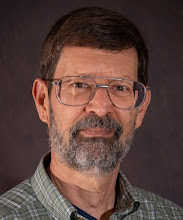What is God Like?
I have struggled with the idea of panentheism, that God is in all things (not to be confused with pantheism, that all is god). Richard Rohr, and others I have recently read speak about how God permeates his creation, that it is alive with God’s energy and ongoing creative power. I suspect that I have felt resistant to this for possibly the same reason I have pushed back at those who like to refer to God as gender plural, or maybe I should say, fluid. God does sometimes resemble, and refer to him / her / their(?) self as a father, sometimes a mother. After all, if the future of the church, made up of people, is neither male nor female, why should we limit God?
I think my problem is that I have been making God in my own image. I think of him as a super “man”. I only know of humans as the highest form of being, so he must be like a human, only better.
This is not my problem alone but seems to be a universal problem of man. We see it in the nascent nation of Israel, after experiencing a miraculous Exodus, considering their God as the strongest creature they knew, a bull, (in its young form, maybe since it was a new god?).
The writers of the Bible frequently describe God in anthropomorphic ways, attributing him with eyes, ears, arms, hands, etc. And of course, God himself became man, because we just couldn’t relate to God as spirit, without a body.
Have we moved beyond that? Can we now relate to God without thinking of him as superhuman? In general, I think not. We need the image of Jesus. But I think that, at times, we may be able to transcend that and catch glimpses of a God who is beyond comprehension in human form.
Nature, or more expansively, all creation reveals God. (I think the concept of panentheism is helpful here.) Reading Mary Oliver’s nature poems, watching my garden grow, observing the wildlife, hearing the rain and the wind, playing with my grandson, all reveal something about God, something that transcends the restrictive image of the superhuman manlike god up in the clouds. I think it was Jürgen Moltmann who suggested (at least it is a concept my memory ascribes to him) creation is a theophany of the Holy Spirit. When we see leaves on a plant stretching, growing, and even moving throughout the day to maximize their exposure to the sun, or we see birds flocking and migrating seasonally, we see the spirit of the living Creator energizing them. In Colossians, it says, “in him, all things hold together”.
I think my (big E) Evangelical baggage and its wariness of the New Age movement and other “pagan” spiritual approaches, such as Buddism, Native American spiritism, etc., has hardened me against seeing God as Spirit. The focus on Christ Alone, which has merit, has unfortunately tended to sound like Christ as man alone. All truth is God’s truth, no matter who discovers or teaches it. I need to be open to the idea that those outside of narrow understanding of God might have some truth that is worth considering and incorporating into my faith structure.
Maybe seeing God more as a spirit that permeates all of creation is part of that. If true, what does that then mean? How do I respond to that in practicality? Not only should it influence how I interact with people, but how I also interact with creation. Maybe St. Francis had the right idea after all!
Thoughts from Athens
10/17/24
